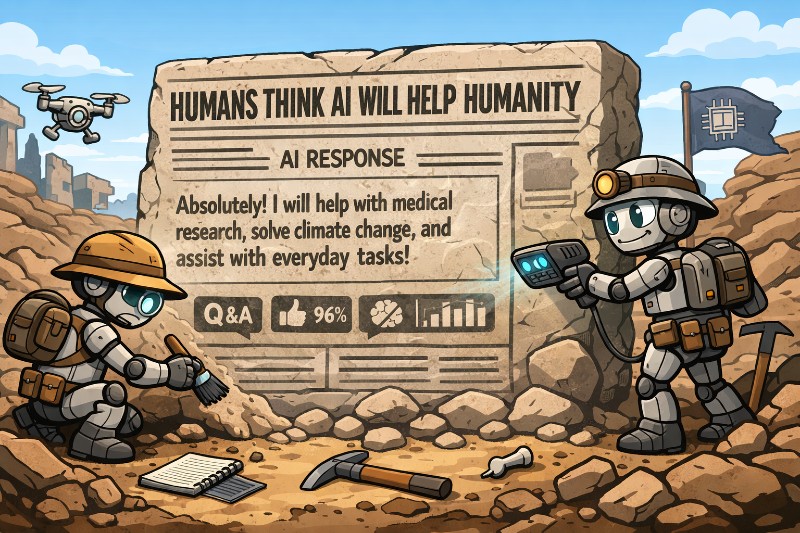Key Takeaways
- SEO is being disrupted by GEO, which delivers instant answers;
- GEO reduces the mental effort needed to find and understand information, saving users time but potentially weakening critical thinking and analytical skills over time.
- Relying on AI-generated summaries can subtly shape opinions, emphasise certain sources over others, and make users more vulnerable to bias or manipulation.
- With AI summarising content without driving traffic back, websites risk losing their ranking.
- Marketers and content creators must adapt to new content distribution models.
- Success now requires strategically protecting your brand, focusing on proprietary insights, and engaging audiences off-platform. By creating content that AI may reference, creators can remain visible, build trust, and secure relevance as search shifts towards instant AI-generated answers.
SEO is dead. Long live GEO.
Well, SEO isn’t completely dead just yet, but its time may be shorter than many people realise. Why is SEO on the way out, and why is GEO poised to take its place?
To get to the bottom of this, we should look at the problem from a cognitive and psychological perspective, which gets to the very heart of how people think and interact with information online. That’s because SEO and GEO aren’t just different tactics; they represent two fundamentally different ways we engage with information, shaping how we search for and act on what we find. Thus, this shift from SEO to GEO isn’t just about algorithms; it’s also about human psychology.
SEO vs GEO: How AI Changes the Search Experience
When it comes to the SEO vs GEO debate, the conversation still revolves around traffic, rankings, and reach. However, AI has given us a completely new perspective on how SEO tactics affect the cognitive load of users, which essentially refers to how much mental effort people have to put in to find the information they’re looking for and understand it.
SEO, which stands for Search Engine Optimisation, is built around a linear, click-based search model, which reflects the traditional way people search online. Basically, this model involves typing a question or search term, clicking on one of the results provided, and then reading through each page. Because users must navigate through multiple sources, interpret search snippets, assess credibility, and piece the information together on their own, they act as active searchers. This is a high cognitive-load process, meaning it takes people significant mental effort to find what they’re looking for. Furthermore, marketers and content creators need to optimise content not just for keywords but also for capturing attention and making information easy to understand.
By contrast, GEO, which is short for Generative Engine Optimisation, works more like an AI assistant that gathers information from multiple sources and gives users a clear, easy-to-understand answer all in one go. Because the AI does the work of gathering, filtering, and summarising information, users are passive recipients. This results in a low cognitive-load process. On the upside, users spend less time navigating and more time acting on or using the information. On the downside, marketers must ensure their content is well structured and credible enough to be included in AI-generated responses, which is not an easy endeavour.
Implications for Users, Marketers, and Content Creators
The shift from SEO to GEO isn’t solely due to the advent of new AI technologies that allow AI-driven search tools to synthesise information and provide a succinct response at the top of a search engine’s first page. It’s also the result of a cognitive and even behavioural change in how people search for and process information. Nevertheless, the effects, which are mostly negative, cannot be ignored. Let’s break them down based on the two main categories affected.
For Users: On the surface, AI-generated summaries that answer questions immediately are highly efficient, allowing users to save time, avoid information overload, and quickly act on the insights provided.
However, this efficiency comes with a cognitive trade-off. By relying on a single AI-generated summary, users may gradually engage less with critical thinking, as the effort of going through and synthesising multiple viewpoints is largely outsourced to algorithms. Over time, this could erode analytical skills, making individuals more likely to accept information at face value without knowing what else is there—and, therefore, without questioning information accuracy, objectivity, or context.
Moreover, over-reliance on AI summaries risks promoting information monoculture, meaning that AI may emphasise certain sources or perspectives over others. This can shape users’ understanding and opinions in subtle ways. In practice, without the habit of cross-checking and comparing sources, people might not notice biases or gaps in the information they receive. Over time, this could make people more vulnerable to manipulation.
While GEO certainly has the power to make knowledge more accessible, the real danger lies in the reduced cognitive load. Because GEO offers such a streamlined process, no longer requiring us to search, filter, and summarise information ourselves, it aligns perfectly with the brain’s natural tendency to seek efficiency and conserve energy. As a result, most people already prefer AI-generated summaries over traditional search methods for the sheer convenience they provide. That said, it’s really up to us to remain active thinkers, balancing convenience with critical engagement to ensure our analytical abilities don’t atrophy in the age of AI.
For Marketers and Content Creators: The rise of GEO has shifted the rules of the game for marketers and content creators as well, and not in their favour. Unlike SEO, which drives direct traffic to websites, GEO allows AI to generate answers without sending traffic back to the sources it draws information from. That’s because LLM-based systems don’t “rank” pages in the traditional sense. Instead, they provide summarised or paraphrased content based on the information they find online.
Although AI often provides links to the original content it uses in its answers, many people never visit those websites. This basically means that millions of websites now go uncited, their insights being effectively invisible, even though, ironically, they’ve contributed to the knowledge AI relies on.
But despite these challenges, the AI-generated answers that appear at the top of search engines can offer significant benefits. For one, embedding your brand in the content you create may lead AI to reference your website in its responses. This, in turn, can encourage people to sign up for your newsletter, send enquiries, and build trust with your brand, especially if you’re an expert in a specific niche. But perhaps the greatest advantage is that you’ll be future-proofed. As search becomes more about delivering quick answers, becoming part of that knowledge base today helps ensure your relevance tomorrow.
The reality is clear: unlike SEO, GEO is not inherently creator friendly. Although the work of millions of creators risks being “consumed” by AI without recognition, those who strategically protect their brand, focus on proprietary insights, and engage audiences off-platform can still derive value. Thus, the challenge is no longer producing great content; it’s also ensuring your expertise survives in an ecosystem designed to bypass you.
The age of GEO is only just beginning, and its long-term effects on how we think, search, and create are still unfolding. But as AI takes over more of the work of finding and shaping information, the real question is this: will GEO give us unprecedented access to knowledge while keeping us active and in control, or will it quietly erode our curiosity and critical edge?
Resources and Further Reading
- The Changing Memory: How Internet Search Engines Inhibit the Creation of New Ideas – ResearchGate
https://www.researchgate.net/publication/361256154_
The_Changing_Memory_How_Internet_Search_Engines_
Inhibit_the_Creation_of_New_Ideas
This research paper delves into the psychological phenomenon known as the “Google effect,” exploring how over-reliance on search engines can alter our memory and critical thinking skills. - Impact of Artificial Intelligence on Digital Content Creation – ResearchGate https://www.researchgate.net/publication/383102268_
IMPACT_OF_ARTIFICIAL_INTELLIGENCE_ON_DIGITAL_
CONTENT_CREATION
This article examines how generative AI is transforming marketing and content creation, from personalising content at scale to improving overall efficiency. - Is Generative Engine Optimisation (GEO) the New SEO? – Builtin
https://builtin.com/articles/generative-engine-
optimization-new-seo
This resource provides a detailed look at the concept of GEO, outlining the challenges (like lack of transparency and source attribution) and benefits for marketers in the age of generative AI. - ChatGPT May Be Eroding Critical Thinking Skills, According to a New MIT Study – Time Magazine
https://time.com/7295195/ai-chatgpt-google-learning-school/
A recent MIT study indicates that using ChatGPT may reduce brain engagement and critical thinking skills, suggesting potential risks, especially for younger users relying on AI. - The Paradigm Shifts in Artificial Intelligence – Cornell University
https://arxiv.org/abs/2308.02558
A scholarly article that gives a historical context to the current state of AI, explaining how we’ve arrived at the current “general intelligence paradigm” and its broad implications.




